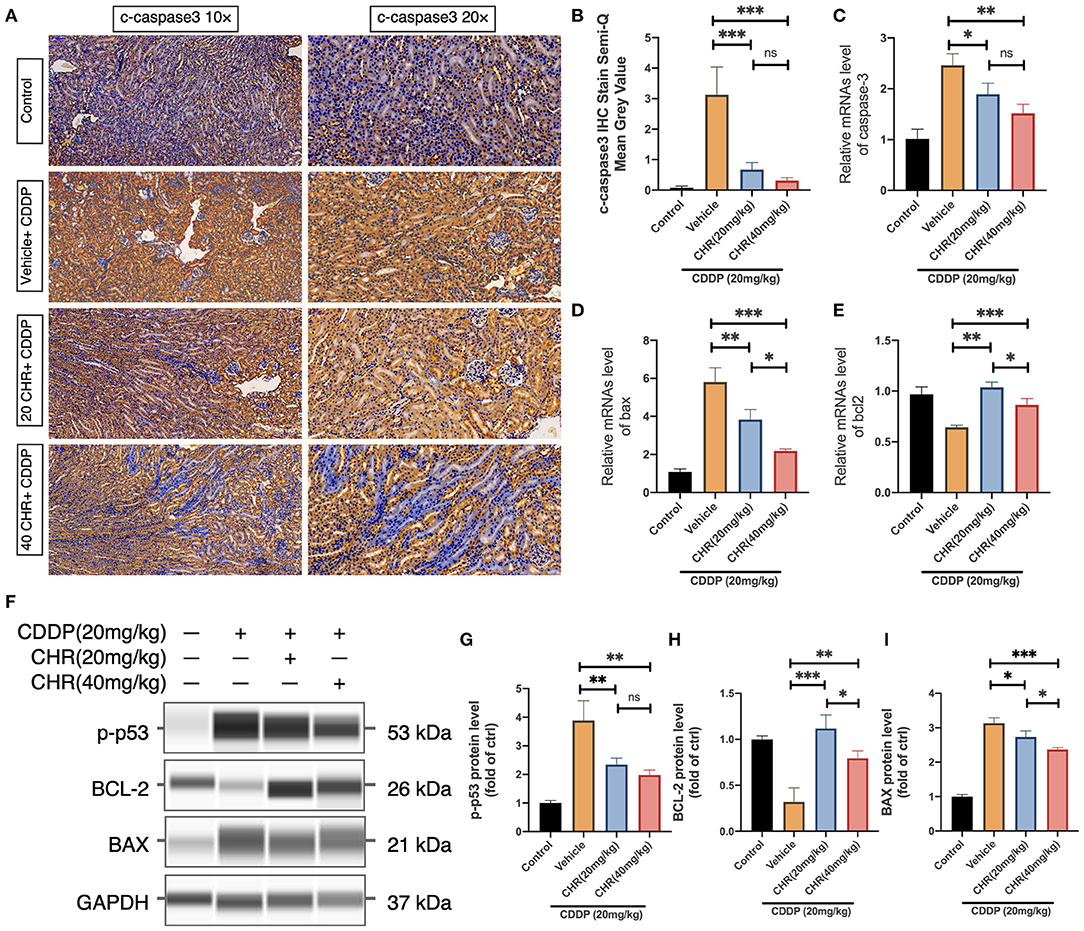Chrysophanol Relieves Cisplatin-Induced Nephrotoxicity via Concomitant Inhibition of Oxidative Stress, Apoptosis, and Inflammation
- 1Department of Clinical Pharmacology, Xiangya Hospital, Central South University, Changsha, China
- 2Hunan Key Laboratory of Pharmacogenetics, Institute of Clinical Pharmacology, Central South University, Changsha, China
- 3Engineering Research Center of Applied Technology of Pharmacogenomics, Ministry of Education, Changsha, China
- 4National Clinical Research Center for Geriatric Disorders, Changsha, China
- 5Department of Laboratory Medicine, State Key Laboratory of Biotherapy and Cancer Center, West China Hospital, Sichuan University, Chengdu, China
- 6The First Affiliated Hospital of Guangdong Pharmaceutical University, Guangdong, China
A Corrigendum on
Chrysophanol Relieves Cisplatin-Induced Nephrotoxicity via Concomitant Inhibition of Oxidative Stress, Apoptosis, and Inflammation
by Ma, S., Xu, H., Huang, W., Gao, Y., Zhou, H., Li X and Zhang W. (2021). Front. Physiol. 12:706359. doi: 10.3389/fphys.2021.706359
Error in Figure
In the original article, there was a mistake in Figure 4 as published. The wrong figure was published. The corrected capillary blot of BAX and GAPDH in Figure 4F is now consistent with the original data submitted during initiation validation process. The corrected Figure 4 appears below.

Figure 4. Chrysophanol pretreatment relieved CDDP-induced nephritic apoptosis of C57 mice via inhibition of p53 activation. (A) Representative graphs of IHC with c-caspase 3 antibody. (B) Semi-quantification and statistical analysis of c-caspase 3 expression for IHC staining in kidney tissues. (C) Caspase 3 mRNA expression. (D) Bax mRNA expression. (E) Bcl-2 mRNA expression. (F) The protein expression of p-p53, BCL-2, BAX, and GAPDH detected by capillary blot. (G) Quantitative and statistical analysis of relative p-p53 level in kidneys. (H) Quantitative and statistical analysis of relative BCL-2 level in kidneys. (I) Quantitative and statistical analysis of relative BAX level in kidneys. *p < 0.05, **p < 0.01, and ***p < 0.005. ns, no statistical difference.
The authors apologize for this error and state that this does not change the scientific conclusions of the article in any way. The original article has been updated.
Publisher's Note
All claims expressed in this article are solely those of the authors and do not necessarily represent those of their affiliated organizations, or those of the publisher, the editors and the reviewers. Any product that may be evaluated in this article, or claim that may be made by its manufacturer, is not guaranteed or endorsed by the publisher.
Keywords: chrysophanol, cisplatin, acute kidney injury, oxidative stress, apoptosis, inflammation
Citation: Ma S, Xu H, Huang W, Gao Y, Zhou H, Li X and Zhang W (2021) Corrigendum: Chrysophanol Relieves Cisplatin-Induced Nephrotoxicity via Concomitant Inhibition of Oxidative Stress, Apoptosis, and Inflammation. Front. Physiol. 12:794302. doi: 10.3389/fphys.2021.794302
Received: 13 October 2021; Accepted: 26 November 2021;
Published: 09 December 2021.
Edited and reviewed by: James A. McCormick, Oregon Health and Science University, United States
Copyright © 2021 Ma, Xu, Huang, Gao, Zhou, Li and Zhang. This is an open-access article distributed under the terms of the Creative Commons Attribution License (CC BY). The use, distribution or reproduction in other forums is permitted, provided the original author(s) and the copyright owner(s) are credited and that the original publication in this journal is cited, in accordance with accepted academic practice. No use, distribution or reproduction is permitted which does not comply with these terms.
*Correspondence: Xiong Li, bGl4aW9uZyYjeDAwMDQwO2dkcHUuZWR1LmNu; Wei Zhang, Y3N1emhhbmd3ZWkmI3gwMDA0MDtjc3UuZWR1LmNu
 Siqing Ma
Siqing Ma Heng Xu
Heng Xu Weihua Huang
Weihua Huang Yongchao Gao
Yongchao Gao Honghao Zhou1,2,3,4
Honghao Zhou1,2,3,4 Xiong Li
Xiong Li Wei Zhang
Wei Zhang